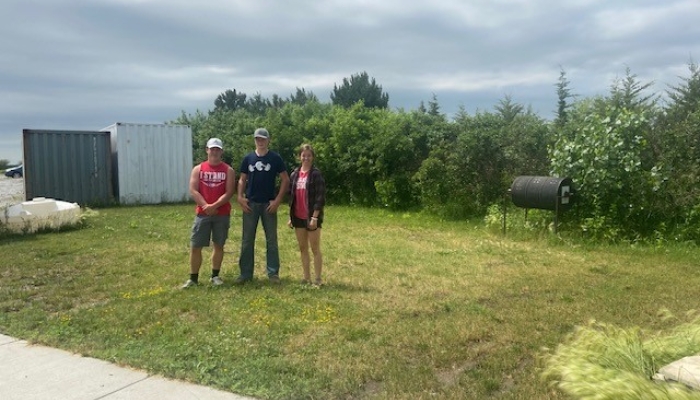Educational Garden Project Awarded Grant from NRD
The board of directors of the Upper Big Blue Natural Resources District has recently approved a $1,900 grant for Cross County Public Schools for the creation of a sensory garden. The purpose of the Educational Capital Projects Fund is to create, develop, or enhance natural resources related educational capital projects that create experiential learning environments and opportunities for district citizens.
“The proposed Cross County sensory garden will bring purpose and beauty to a currently underutilized space. Our design has several pieces that enrich the learning experience by appealing to the senses, while encouraging conservation and environmental support,” said Christine Jarosz, agricultural education instructional paraeducator, in her application for NRD funds. Jarosz is a part of the sensory garden committee as she previously collaborated on a similar project at a home for individuals with special needs in central Nebraska.
The proposed plan at Cross County includes raised vegetable beds, a small garden pond with fish, a seating area, as well as spaces for a variety of native and exotic vegetation. Students will be involved in the creation and maintenance of the garden, which will provide produce that will be used in Family and Consumer Science classes and the lunchroom. Depending on how successful the garden is, students may also have the opportunity to practice marketing and sales of their product within the community.
“This undertaking will be a means in which Cross County Community Schools can give real, hands-on lessons in life skills to our students,” said Jarosz. “Allowing students to have ownership in the project will lend itself to a natural progression of developing the necessary skills for future employment, trades, and educational endeavors.”
The garden will also be an opportunity for students with diverse needs. “Bringing this project to life will allow numerable opportunities to reach students that learn differently than what a traditional classroom setting offers,” said Jarosz.
The creation of the garden will be a school and community-wide effort, as the FFA, agriculture education, and skilled and technical sciences students will work with local nurseries and landscaping professionals as well as community volunteers to create the garden.
Applications for ECAP funds are accepted throughout the year and are voted on by the board each May. For more information or to apply, visit www.upperbigblue.org/education.
Photo: Colby Bolton, Noah Sandell, and Addie Linn at the future location of the Cross County sensory garden project
“The proposed Cross County sensory garden will bring purpose and beauty to a currently underutilized space. Our design has several pieces that enrich the learning experience by appealing to the senses, while encouraging conservation and environmental support,” said Christine Jarosz, agricultural education instructional paraeducator, in her application for NRD funds. Jarosz is a part of the sensory garden committee as she previously collaborated on a similar project at a home for individuals with special needs in central Nebraska.
The proposed plan at Cross County includes raised vegetable beds, a small garden pond with fish, a seating area, as well as spaces for a variety of native and exotic vegetation. Students will be involved in the creation and maintenance of the garden, which will provide produce that will be used in Family and Consumer Science classes and the lunchroom. Depending on how successful the garden is, students may also have the opportunity to practice marketing and sales of their product within the community.
“This undertaking will be a means in which Cross County Community Schools can give real, hands-on lessons in life skills to our students,” said Jarosz. “Allowing students to have ownership in the project will lend itself to a natural progression of developing the necessary skills for future employment, trades, and educational endeavors.”
The garden will also be an opportunity for students with diverse needs. “Bringing this project to life will allow numerable opportunities to reach students that learn differently than what a traditional classroom setting offers,” said Jarosz.
The creation of the garden will be a school and community-wide effort, as the FFA, agriculture education, and skilled and technical sciences students will work with local nurseries and landscaping professionals as well as community volunteers to create the garden.
Applications for ECAP funds are accepted throughout the year and are voted on by the board each May. For more information or to apply, visit www.upperbigblue.org/education.
Photo: Colby Bolton, Noah Sandell, and Addie Linn at the future location of the Cross County sensory garden project

